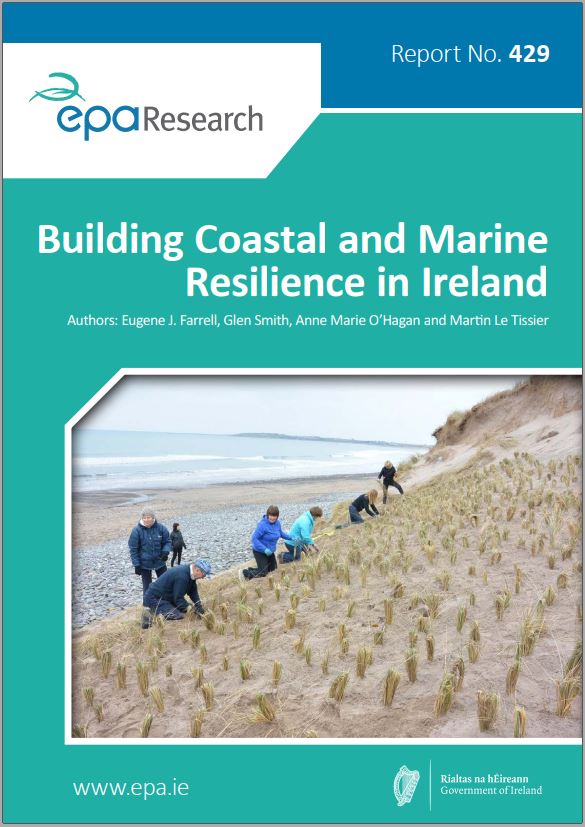Authors: Eugene J. Farrell, Glen Smith, Anne Marie O’Hagan and Martin Le Tissier
Summary: The identification and increased awareness of climate change risks to Ireland’s coastal communities highlights the importance of building national resilience across socio-ecological and economic systems. This research investigated barriers to the environmental and socio-economic resilience of two coastal communities: Maharees, County Kerry, and Youghal, County Cork.

Watch the project highlights video
The identification and increased awareness of climate change risks to Ireland’s coastal communities highlights the importance of building national resilience across socio-ecological and economic systems. This research investigated barriers to the environmental and socio-economic resilience of two coastal communities: Maharees, County Kerry (rural; population c.300), and Youghal, County Cork (urban; population c.8400). In Maharees, coastal erosion and tourism are two primary pressures, while in Youghal pressure from repeat flooding affects the natural and built features of the town infrastructure
In both locations, as is common across Ireland, community-led efforts to build resilience to climate change are hindered by the absence of an engagement mechanism that recognises the validity of community-determined pathways to resilience, and forums that promote exchange of technical and policy knowledge and understanding to inform decision-making.
This project contextualised climate and development initiatives in both locations using the Intergovernmental Panel on Climate Change (IPCC) opportunity space and climate-resilient pathways approach and provided them with a means to structure and navigate a roadmap founded on community-driven perceptions of a resilient future.
The need for accelerated action to build climate resilience through risk sensitive planning, advancing adaptation, and risk assessment and management is well known. The effectiveness of Ireland’s response to climate change under various existing international, EU and national instruments is contingent on continued information gathering and understanding of impacts across sectors and society. Ensuring that policy responses are coherent across all sectors and are trusted by, and inclusive of, affected communities are key challenges to building coastal resilience.
Across Ireland, the fragmented management of the coast has been a persistent challenge, with numerous departments and public bodies having a remit in the coastal area, exacerbated by policy objectives that often do not align with each other. If left unaddressed, this will continue to result in the unsustainable management of coastal resources and increasing vulnerability of coastal communities.
This project presents two case studies highlighting how climate action and resilience building are operationalised at a local level in rural and urban settings, and how well the existing governance frameworks are suited to supporting building resilience to climate change.
Through an adaptation of the IPCC’s opportunity space and climate-resilient pathways approach, the project demonstrated a visual and collaborative structure and framework to help coastal communities engage in a process of building resilience and removing barriers to their participation in climate action and adaptation. The pathways approach can lead to roadmaps that build the capacity of local-level socio-ecological systems by providing a structure to discuss knowledge gaps in coastal science, policy, governance and management, and placing these in the context of the process and decisions required to build local-scale resilience.
The project identified key institutional barriers (governance; legal responsibility; stakeholder forum; tourism) and technical barriers (climate adaptation; funding; environmental designation; lexicon of climate resilience and sustainability; erosion and flooding; seasonal tourism) to coastal communities building resilience to climate change.
Our results emphasise the need for the coordination of actions and regional priorities of local authorities for coastal adaptation; the critical need to empower and resource local authorities and communities to manage their coasts; and a coherent national plan to prioritise erosion and flood risks.
https://www.epa.ie/media/epa-2020/research/epa-funded-research/Report-cover-429.jpg